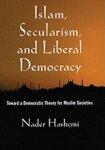
Book Summary
Islam's relationship to liberal-democratic politics has emerged as one of the most pressing and contentious issues in international affairs. This book analyzes the relationship between religion, secularism, and liberal democracy, both theoretically and in the context of the contemporary Muslim world. This book challenges a widely held belief among social scientists that religious politics and liberal-democratic development are structurally incompatible. While there are certainly tensions between Islam and democracy -- Hashemi draws on Iran as an example -- the two are not irreconcilable. He affirms the need for political secularism in order for liberal democracy to flourish, and examines how Muslim societies can develop the political secularism required for liberal democracy when the main political, cultural and intellectual resources that are available are religious. Hashemi argues that democratization and liberalization do not necessarily require a rejection or privatization of religion but do require a reinterpretation of religious ideas about the moral basis of legitimate political authority and individual rights. In fact, he shows, liberal democracy in the West often developed not in strict opposition to religious politics but in concert with it. Hashemi argues that an indigenous theory of Muslim secularism -- similar to what developed in the Christian West -- is possible and a necessary requirement for the advancement of liberal democracy in Muslim societies. Islam's relationship to liberal-democratic politics has emerged as one of the most pressing and contentious issues in international affairs. Nader Hashemi challenges the widely held belief among social scientists that religious politics and liberal-democratic development are structurally incompatible. While there are certainly tensions between religion and democracy, the two are not irreconcilable. Liberal democracy requires a form of secularism to sustain itself, yet the main, political, cultural and intellectual resources that Muslim democrats can draw upon are religious. How can this paradox be reconciled? Hashemi makes three principal arguments. First, in societies where religion is a key marker of identity, the road to liberal democracy must pass through the gates of religious politics. The process of democratization, therefore, cannot be artificially de-linked from debates about the normative role of religion in government. Secondly, while liberal democracy requires secularism, religious traditions are not born with an inherent secular and democratic conception of politics. These ideas must be developed, and in an emerging democracy, how they are developed is critical. Finally, Hashemi argues that there is an intimate relationship between religious reformation and political development. While the first often precedes the second, these processes are deeply interlinked. Democratization does not require a privatization of religion, but it does require a reinterpretation of religious ideas that are conducive to liberal democracy. By engaging in this reinterpretation, religious groups can play a central role in the development and consolidation of democracy. Islam, Secularism, and Liberal Democracy argues for a rethinking of democratic theory so that it incorporates the variable of religion in the development of liberal democracy. In the process, it proves that an indigenous theory of Muslim secularism is not only possible, but is a necessary requirement for the advancement of liberal democracy in Muslim societies.
Book Details
| Book Name | Islam, Secularism, And Liberal Democracy: Toward A Democratic Theory For Muslim Societies |
| Author | Nader Hashemi |
| Publisher | Oxford University Press, Usa (Mar 2009) |
| ISBN | 9780195321241 |
| Pages | 280 |
| Language | English |
| Price | 1420 |








